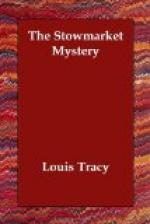The detective opened wide his eyes at this unlooked-for statement.
“I mean it,” said the barrister. “Look at all I have learnt to-day whilst darting about London in that particular hansom, which, mind you, I carefully selected from a rank of twenty. Abandon it until I am dropped at my starting-point! Never!”
Winter sighed.
“I never feel that way about anything on wheels,” he said. “Do you really think you will be able to clear up this affair, sir? It seems to me to be a bigger muddle now than when I left it after the second trial. Don’t laugh at me. That is awkwardly put, I know. But then we had a straightforward crime to deal with. Now, goodness knows where we have landed.”
Smith entered, and commenced laying the table. Brett did not reply to the detective’s spoken reverie. Both men idly watched the deft servant’s preparations.
“Smith,” suddenly cried the master of the household, “what sort of chicken have we for dinner?”
“Cold chicken, sir.”
“Thank you. As you seem to demand Miltonic precision in phrase, I amend my words. What breed of chicken have we for dinner?”
“A dorking, sir.”
“And how do you know it is a dorking?”
“Oh, there’s lots of ways of knowin’ that, sir. You can tell by the size, by its head and feet, and by the tuft of feathers left on its neck.”
“Q.E.D.”
“Beg pardon, sir!”
“I was only saying, ‘Right you are!’”
Smith went out, and Brett turned to his companion:
“Did you note Smith’s philosophy in the matter of dorkings?” he inquired.
“Yes.”
“Does it convey no moral to you? I fear not. Now mark me, Winter. Just as the breed of the chicken is indelibly stamped on it in the eyes of a man skilled in chickens, so is the murder we are investigating marked by characteristics so plain that a child of ten, properly trained to use his eyes, might discern them. What you and I suffer from are defects implanted by idle nursemaids and doting mothers. Let us, for the moment, adopt the policy of the theosophists and sit in consultation apart from our astral bodies. Who killed Sir Alan Hume-Frazer? I answer, a relative. What relative? Someone we do not know, whom he did not know, or who committed murder because he was known. What sort of person is the murderer? A man physically like either David or Robert, so like that ‘Rabbit Jack’ would swear to the identity of either of them as readily as to the person of the real murderer. Why did he use such a weird instrument as the Ko-Katana? Because he found it under his hand and recognised its sinister purpose, to be left implanted in the breast or brain of an enemy’s lifeless body. Where is the man now? In London, perhaps outside this building, perhaps watching the Northumberland Avenue Hotel, waiting quietly for another chance to take the life of the person who caused us to reopen this inquiry. To sum up, Winter, let us find such an individual, a Hume-Frazer with black, deadly eyes, with a cold, calculating, remorseless brain, with a knowledge of trick and fence not generally an attribute of the Anglo-Saxon race—let us lay hands on him, I say, and you can book him for kingdom come, via the Old Bailey.”




